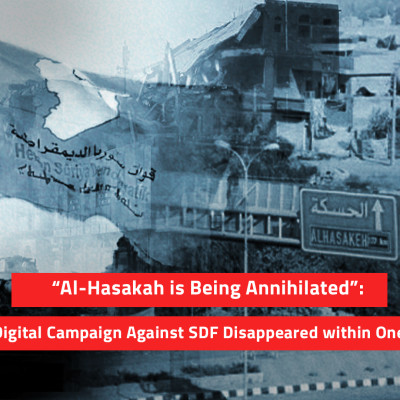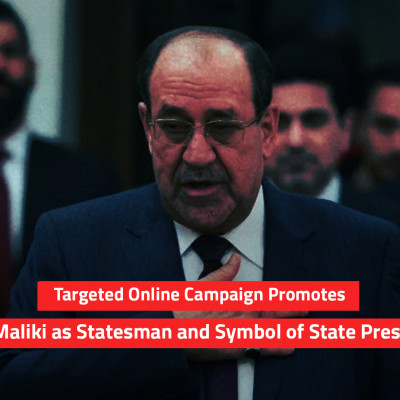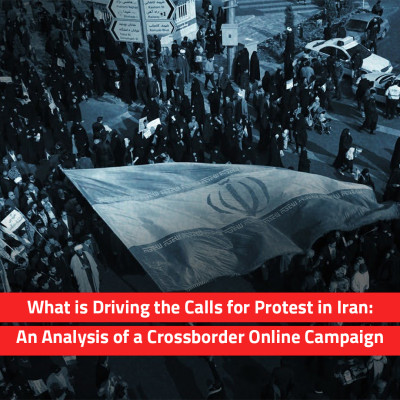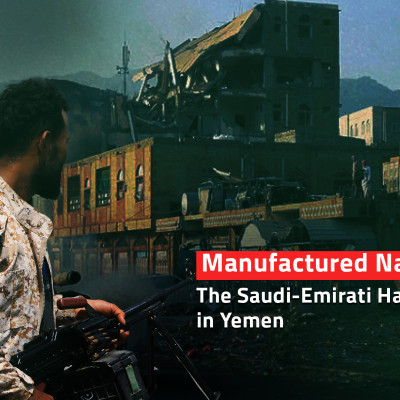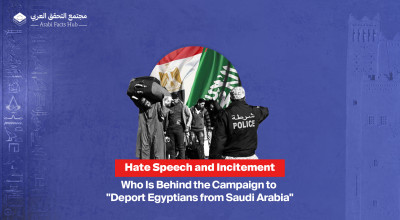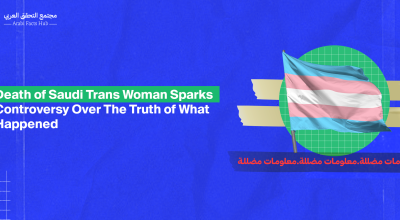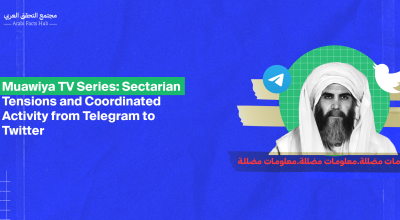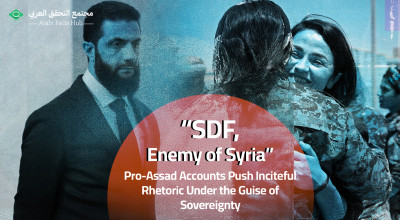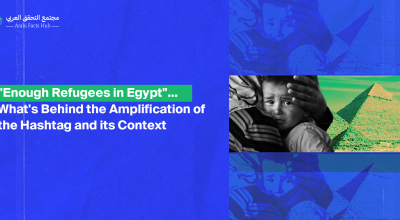“Enough Refugees”...coordinated campaigns in Egypt to deny entry to Sudanese citizens fleeing the war
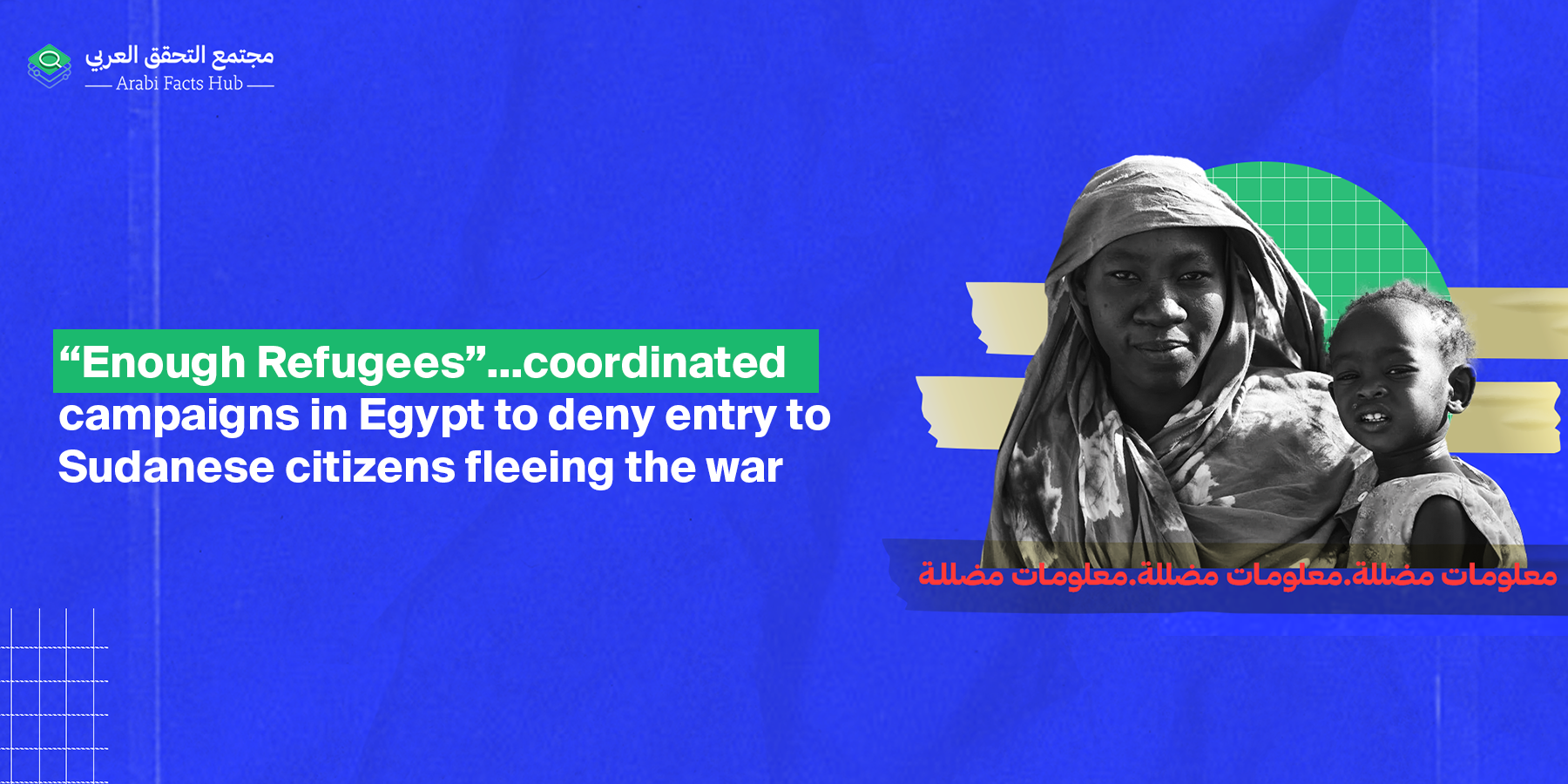
This is part of a series of investigative reports published in collaboration with Daraj media
Prominent pages and personal accounts on Facebook participated in hashtags against the presence of Sudanese refugees in Egypt. The nature of the interactions revealed an organized and coordinated effort to increase non-spontaneous activity with the aim of presenting an artificially negative image of the Sudanese people. The outbreak of hostilities in Sudan prompted the influx of tens of thousands of people fleeing the war into neighboring countries. Social media reactions varied between those welcoming and those objecting to the displacement of Sudanese people to Egypt.
As of May 4, more than 56,000 people arrived in Egypt from Sudan, including at least 52,500 Sudanese and 3,950 of other nationalities, according to estimates by the Egyptian Ministry of Foreign Affairs. The United Nations High Commissioner for Refugees (UNHCR) said it expects an influx of 860,000 refugees from Sudan in the coming months, more than 100,000 of whom have already left the country for neighboring countries such as Egypt, Chad, South Sudan, Ethiopia and the Central African Republic. While some Egyptians welcomed the Sudanese newcomers, there was concerted activity calling for the closure of borders and the cancellation of visas granted to Sudanese citizens for entry to Egyptian territories.
What happened?
In 2004, Egypt and Sudan signed the “Four Freedoms” agreement, which includes freedom of movement and facilitating the movement of citizens of the two countries. In a statement made by Egyptian President Abdel Fattah El-Sisi in his interview with the Japanese newspaper “Asahi” in early May, 2023 he said “there are already millions of Sudanese people in Egypt. We do not refer to them as refugees, but as guests, and there are between 8 and 9 million guests from Libya, Syria, Yemen and other African countries”. The statistics mentioned by the Egyptian president are consistent with the estimates of the International Organization for Migration, which show that Egypt hosts 9 million people, who are not only refugees, but who vary between immigrants, residents and visitors.
In his interview with the Japanese newspaper, Sisi expressed his hopes for the stabilization of the situation, saying, "Once the situation stabilizes, those who fled their countries will return to their homes because Egypt cannot bear this burden."
Sisi's statements came at the backdrop of an escalating situation in Sudan and the influx of Sudanese refugees fleeing the ongoing conflict between the Sudanese army led by Abdel Fattah al-Burhan and the Rapid Support Forces led by Mohamed Hamdan Dagalo (Hemedti).
In similar remarks, the Egyptian Foreign Minister, Sameh Shoukry, told media personality Ahmed Moussa that Egypt cannot bear this burden without Europe fulfilling its responsibilities, given that Europe’s resources surpass those of Egypt. He stated that Europe must adhere to its international commitments and humanitarian framework regarding refugees and displaced persons.
This prompted virtual support groups rallying behind the Egyptian president, along with nationalists opposed to refugees and averse to foreigner presence in Egypt, to initiate synchronized social media campaigns. They perceived a "shift in tone" or stance towards refugees in the statements made by Shoukry and Sisi.
It's important to highlight that the dissemination of hate speech targeting refugees in Egypt via social media has a history spanning several years. Originally directed at Syrians escaping the civil war, these efforts have been sustained by ongoing campaigns, labeling Syrian refugees as the "Hyksos," a term associated with pastoralist tribes from the Levant that once governed certain regions of ancient Egypt.
Active Hashtags Objecting to the Arrival of Sudanese Citizens
Meanwhile, a range of hashtags opposing the arrival of Sudanese citizens in Egypt has gained traction, drawing support from certain segments aligned with this discourse. Despite the heightened activity of such rhetoric on social networks and concerns about potential violence against refugees, the tangible impact on the ground has been relatively limited thus far.
These hashtags have been active on various social media platforms, generating thousands of posts and tweets, along with corresponding interactions, in an attempt to amplify the anti-refugee sentiment and give the impression that it is a "popular demand."
The hashtags call for closing the borders to Sudanese refugees, canceling their entry visas, and deporting them from Egypt, as well as shutting down the headquarters of the High Commissioner for Refugees. For example, there were ten active hashtags on this topic on Facebook, including: #Enough_Refugees, #Enough_Refugees_in_Egypt_We_are_Disgusted, #Expel_Sudanese_from_Egypt, #Not_Welcome_Sudanese_in_Egypt, #Close_the_Borders, #Refugees_are_a_threat_to_Egypt, #Close_the_Commission_and_expel_refugees, #Closing_borders_is_a_popular_demand, #No_to_Canceling_Egyptian_Visa_Requirements and #No_to_Canceling_Egypt_Entry_Visa_Requirement.
#لا_لإلغاء_تأشيرات_الدخول_لمصر”.

Screenshots of posts with the hashtag #Enough_Refugees on Facebook – using the Crowd Tangle tool.
Who is behind the campaigns?
Personal accounts and well-known pages on Facebook participated in hashtags opposing the presence of Sudanese refugees in Egypt. The nature of interactions revealed an organized and coordinated effort to increase non-spontaneous activity with the aim of portraying a negative and artificial image of Sudanese individuals.
An investigation into the source of posts published under these hashtags and the reactions to them reveals an active role played by groups involved in electronic campaigns defending government policies and attacking its critics. These groups also embellish the statements made by the president and distort the views of his opponents. Concurrently, they engage in activities to foster a hostile atmosphere towards refugees and foreigners in general in Egypt.
One such group is known as the "Egyptian Alliance for Social Media News," a Facebook group established in October 2020 with over 27,000 members. The group featured numerous posts by its members about the influx of refugees into Egypt and delved into the archives of Sudanese tweeters in past years to portray them negatively.
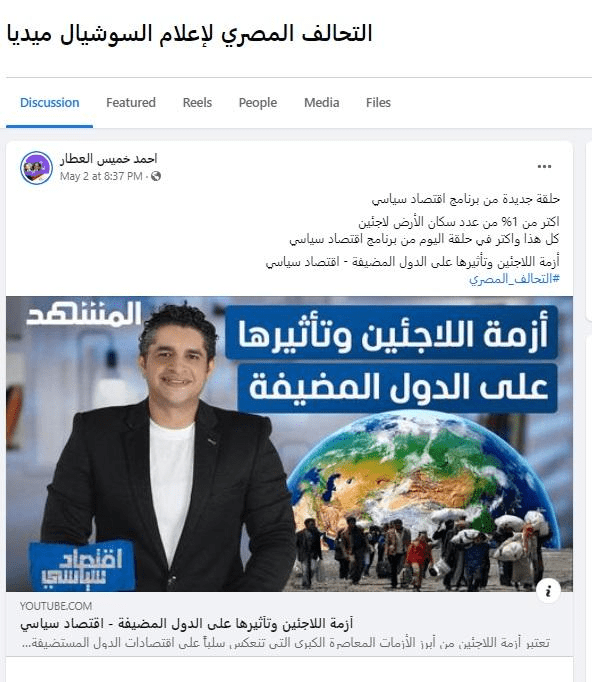
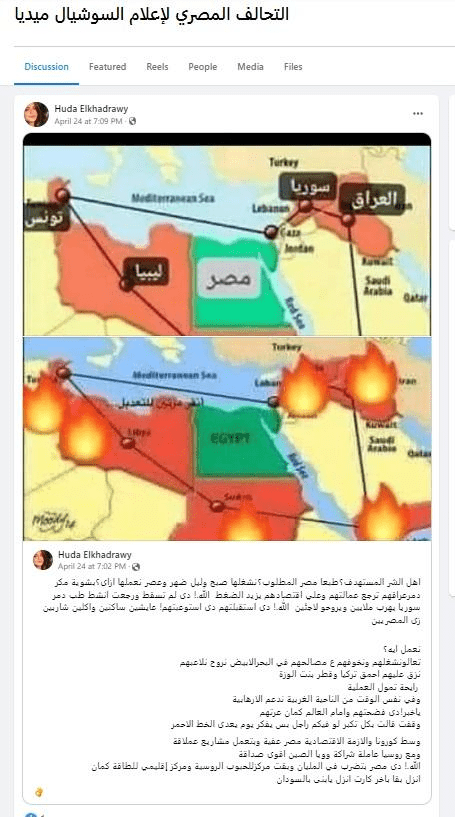
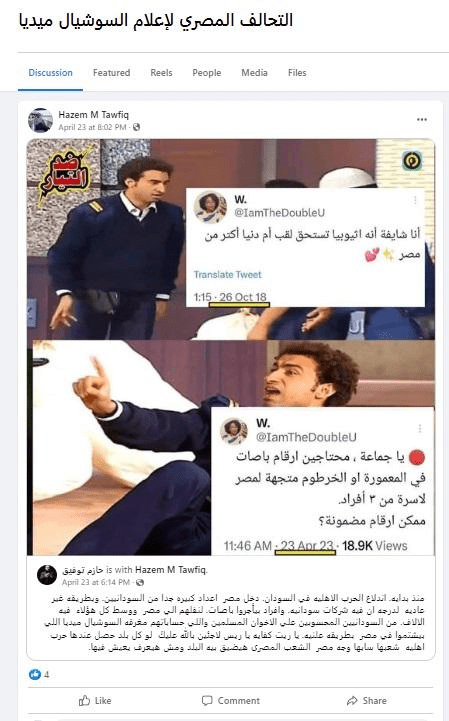
The concept behind forming the Egyptian Alliance for Social Media appears to be for it to serve as an informal media brigade or virtual front to defend the government. The alliance includes journalists and individuals, some of whom gain marginal prominence by presenting themselves as analysts on Egyptian channels.
Moreover, aside from participating in similar narratives, there are other pages and groups aligned with this ideology. An example is the Facebook group "The Union of State Supporters" with a membership of 94,000, established by Ibrahim Al Garhy. Al Garhy is recognized for spearheading online campaigns in favor of the government and launching attacks against opponents in recent years. Subsequently, he made a transition to become a television show host on channels owned by Egyptian security agencies.
The alliance also includes individuals with affiliations to official circles. The group's founder, Islam Abbas, has been involved in official events, such as the annual "Egyptian Family Iftar" during Ramadan and the "World Youth Forum," both occasions attended by President Abdel Fattah El Sisi. This connection was previously expounded upon in our analysis of the orchestrated campaign against the release of political activist Alaa Abdelfattah, which unfolded during Alaa’s hunger strike that coincided with the Climate Summit (COP 27) last November.
The activity of alliance members extends beyond Egypt. For instance they staged a protest in front of the European Parliament to oppose its stance against human rights violations in Egypt.
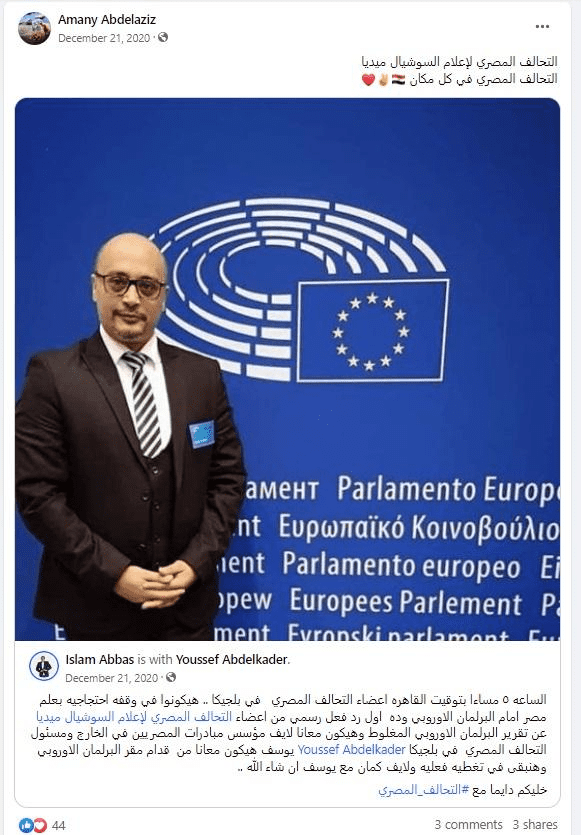
The alliance also actively participated in intense online campaigns that criticized Doha during the years of tension between Gulf countries, including Egypt, and Qatar.
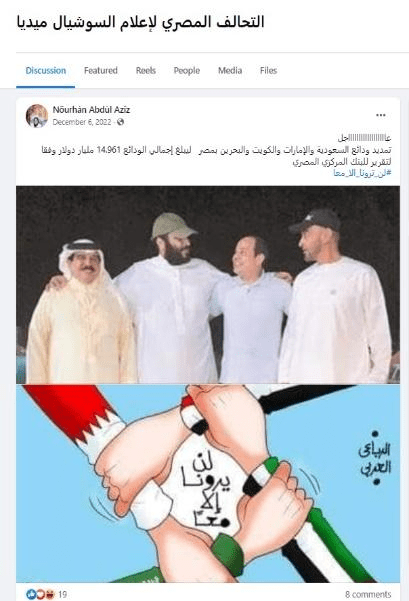
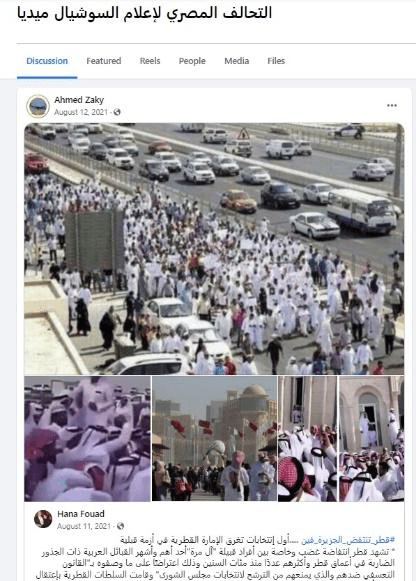
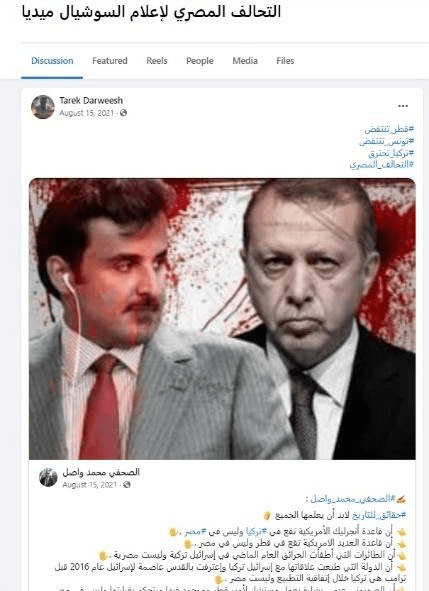
Interestingly, the coordinator of the alliance, Islam Abbas, has not only visited Qatar and the United Arab Emirates but also resided in the Kingdom of Saudi Arabia for a period, particularly in 2011. This is apparent from numerous pictures on his account documenting his time in these countries.
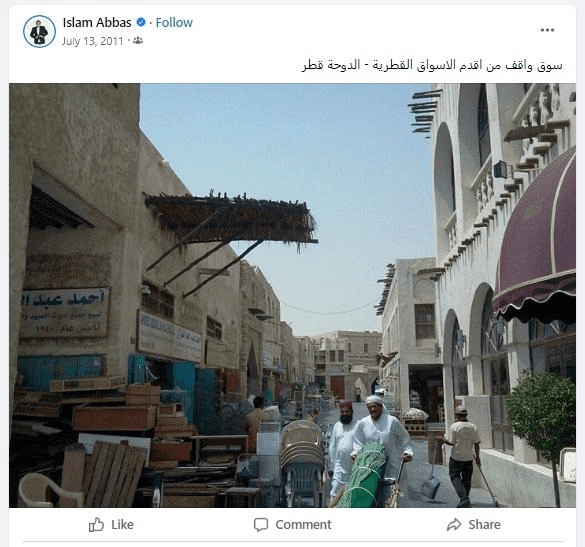
Opposition to Refugees
The "Egypt Awareness" page, counted among the top 10 nationalist pages, collaborates with similar entities and emerges as a significant advocate against the influx of Sudanese refugees to Egypt. Boasting 94,000 followers, the page embraces an extremely nationalist stance that is unfriendly towards foreigners and refugees. It consistently initiates campaigns opposing refugees and firmly rejects the notion of the "Africanization of Egypt," signaling a disapproval of Africans or individuals of African descent being considered part of the Egyptian identity.
Both in design and content, the posts on the page clearly indicate an organized and coordinated effort aimed at amplifying anti-refugee sentiments within the country.
With the influx of Sudanese individuals into Egypt, the page has leveraged statements from the Egyptian president and his foreign minister to bolster its push for rejecting refugees. The page has employed the hashtag #Enough_Refugees, which Facebook estimates to have contained fewer than 1000 posts.
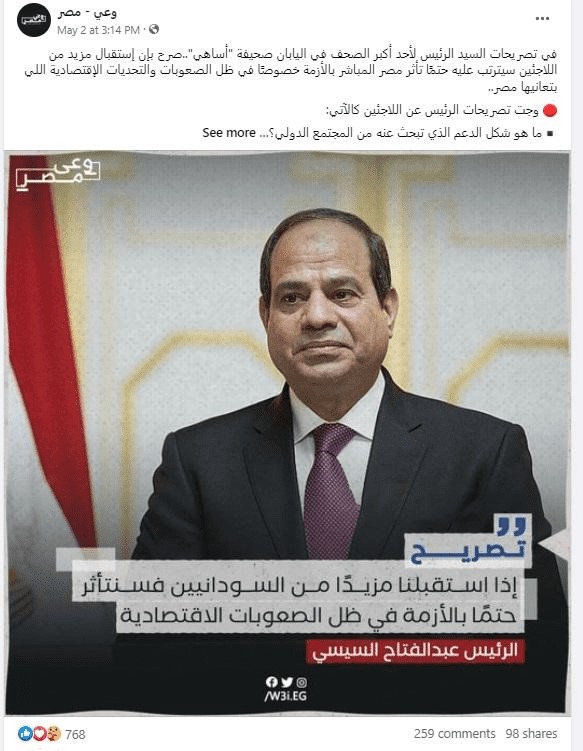
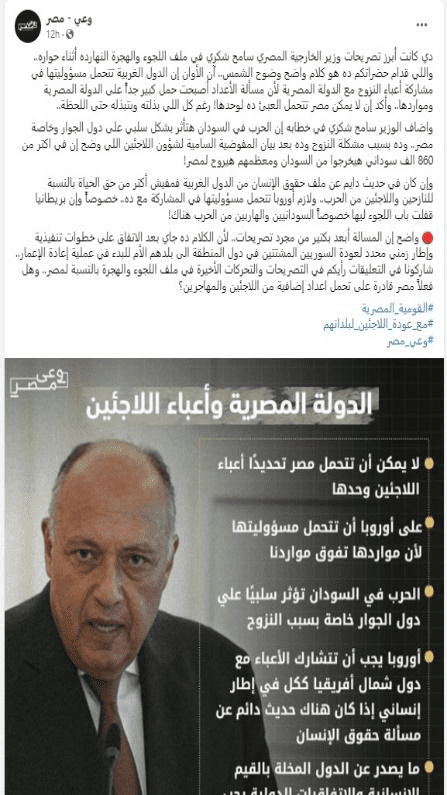
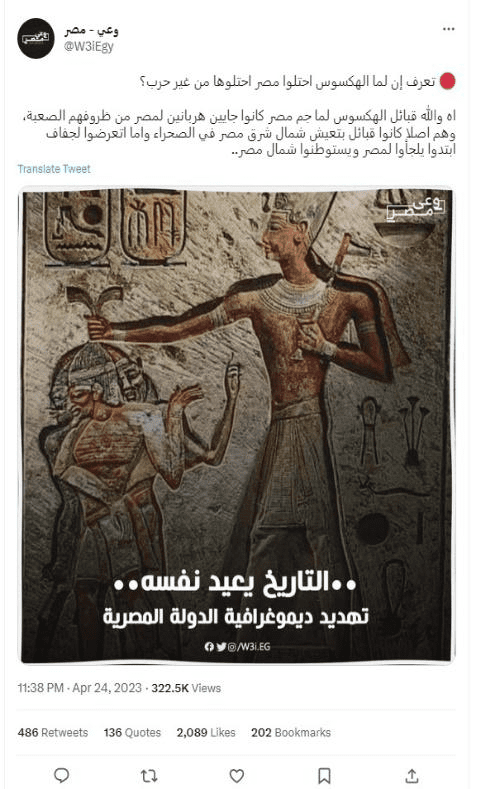
Adding to the irony, we noticed that the "Egypt Awareness" page had become part of the "Egyptian Alliance for Social Media News," as indicated in a post on May 2nd by Amani Abdulaziz, one of the alliance's leaders and the administrator of the group on Facebook. Amani had previously participated in official state events alongside the alliance's coordinator, Islam Abbas.
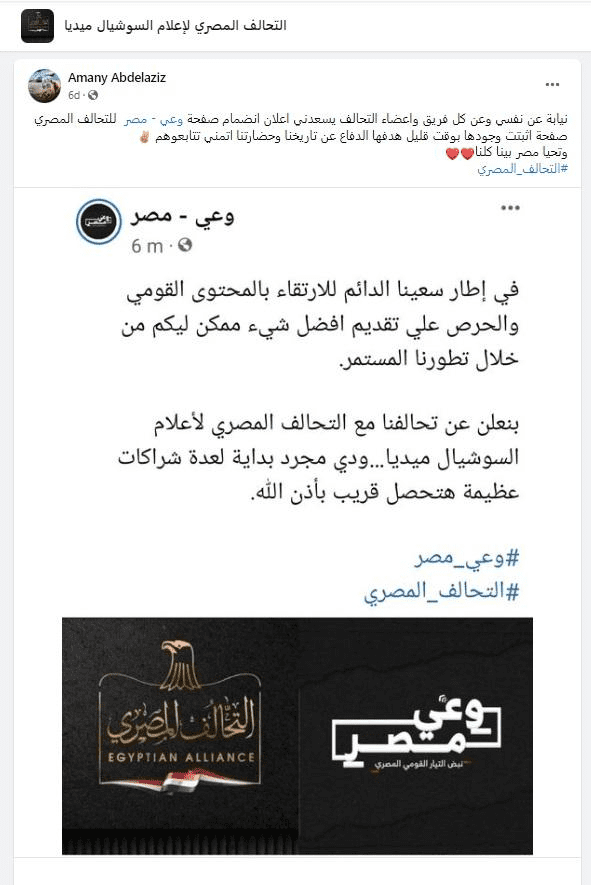
“Cut the coddling”
With over 400,000 followers, Amal Abdullah, also known as "Molly - the Minister of Happiness," used her Facebook page to amplify the momentum of the #Enough_Refugees hashtag, calling for an end to “the coddling” in handling the refugee issue. She urged the use of the hashtag #Cut_The_Coddling along with #No_to_Canceling_Egyptian_Visa_Requirements and #No_to_Canceling_Egypt_Entry_Visa_Requirement. Amal also has a personal Twitter account with the same handle, where she remains active using the same hashtags.
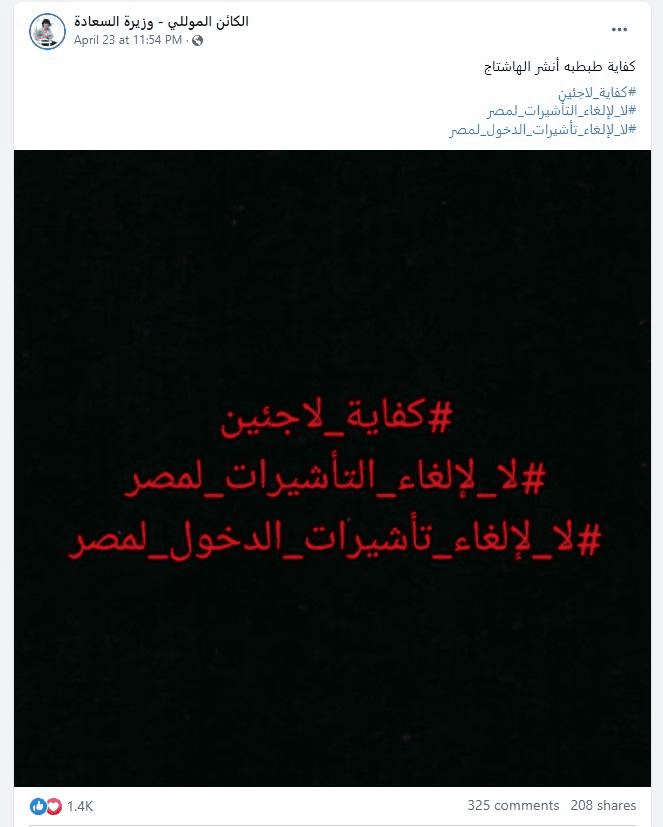
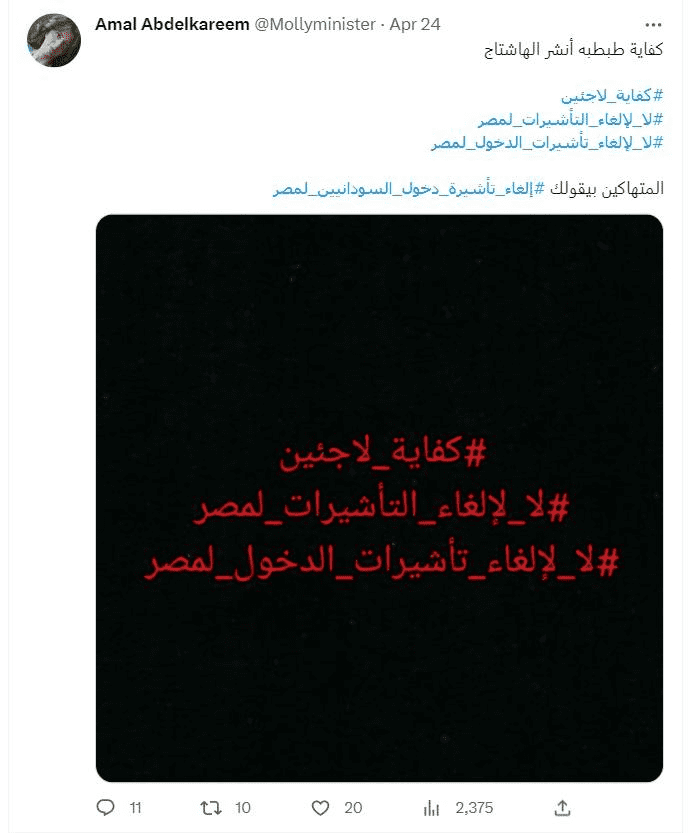
Amal’s page on Facebook is run by at least 10 individuals, as evident from the transparency feature on the platform. Additionally, she maintains accounts on TikTok, Instagram, and Twitter. Engaging in social media for several years, Amal has played a role in promoting numerous hashtags that support the Egyptian president and advocate for his policies. She has spearheaded campaigns, often directed at online harassment, trolling, and tarnishing the reputation of dissenters.
While Amal's online presence doesn't suggest participation in official events, she has been prominently featured in collaborative posts with individuals, influencers, and pages closely tied to official circles. Her perspectives are actively communicated through various social media platforms, including her association with the "Egyptian Alliance for Social Media News."
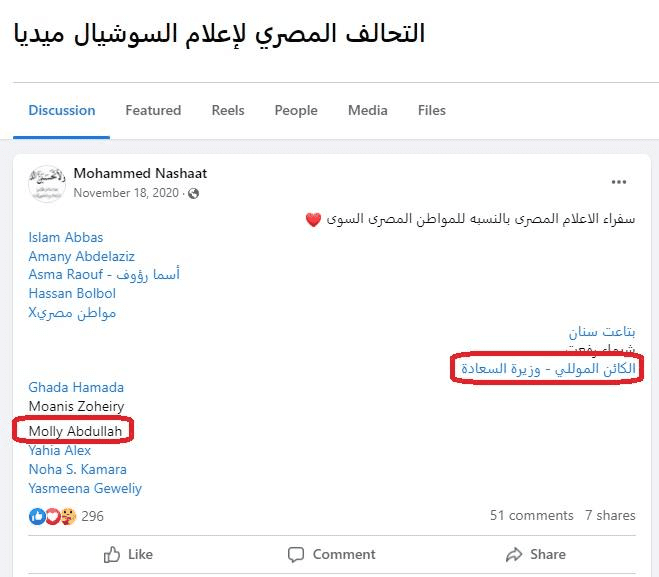
Hate Speech
Certain posts utilizing hashtags against Sudanese refugees included offensive language that verges on hate speech. Expressions like "The country is a swamp for refugees; refugees pose a danger to Egypt; (Sudanese) are mostly mentally disturbed; anticipate the spread of AIDS and cholera; a deluge of Sudanese carrying diseases and epidemics that will afflict Egypt" were observed.
These remarks were prompted by a news article from the Emirati website "24," which reported that "Egypt is bracing for the potential spread of diseases among arrivals from Sudan."
The commander of the Rapid Support Forces receives significant backing from the United Arab Emirates, as well as support from global players, including Russia. This is in contrast to Egypt's support for the Sudanese army and its leader, Abdel Fattah al-Burhan.
While the headline suggests a "possibility," it has sparked considerable controversy and discussion, particularly among those opposed to and those seeking grounds to advocate for the rejection of Sudanese entry into the country.
However, within the article, Dr. Islam Anan, a professor specializing in the spread of epidemics and infectious diseases, explains that the heightened health preparedness by the Egyptian Ministry of Health at border crossings, including medical examinations for those arriving from Sudan to Egypt, aligns with the established health protocols by the United Nations for managing refugee movements between countries globally. Anan further notes in his statements to "24": "This practice is not exclusive to our Sudanese brothers but is a globally recognized standard for refugees entering any country. Similar measures were taken when our Syrian and Yemeni brothers entered Egypt, reflecting the international coordination for refugees worldwide."
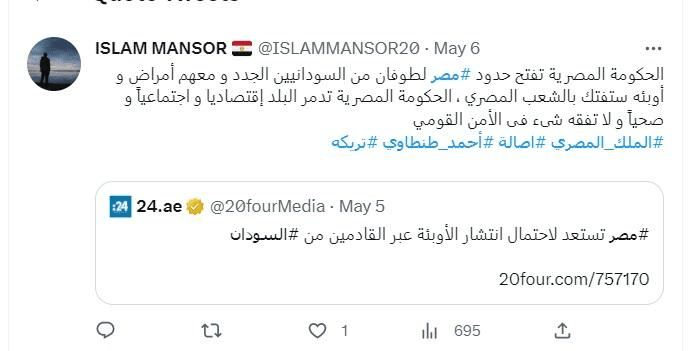
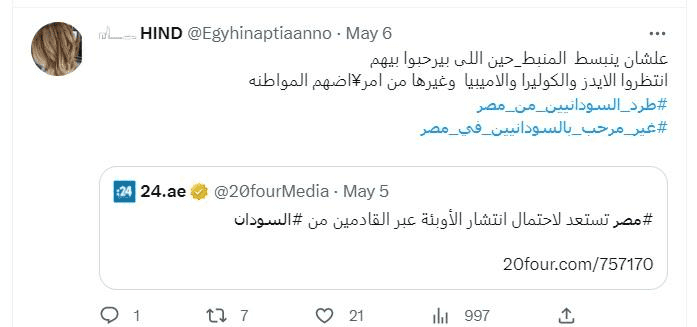
In the same context, other pages and accounts, whether supporting the president or affiliated with the group calling itself the"Sons of Kemet," have intensified their efforts to mobilize support for tweeting using hashtags that oppose Sudanese refugees. Some accounts have taken it a step further by promoting the notion that the flow of migrants and African refugees is part of a conspiracy aimed at overwhelming North African countries, relying on video clips from other countries.
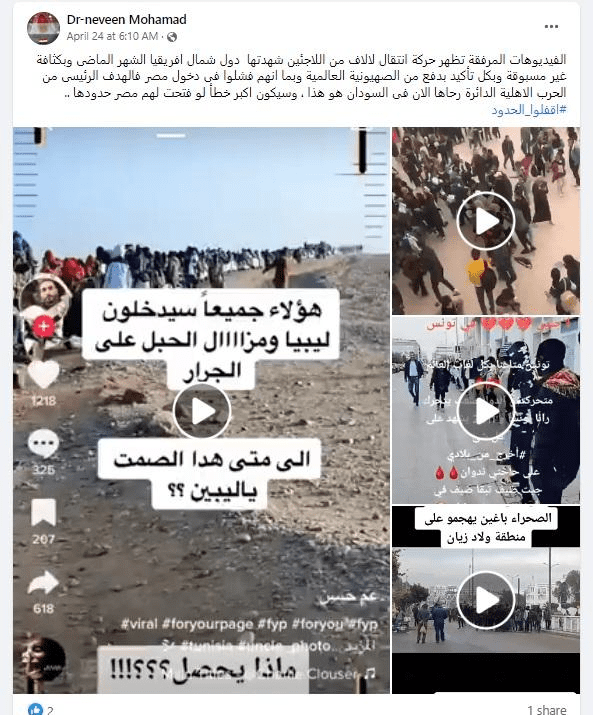
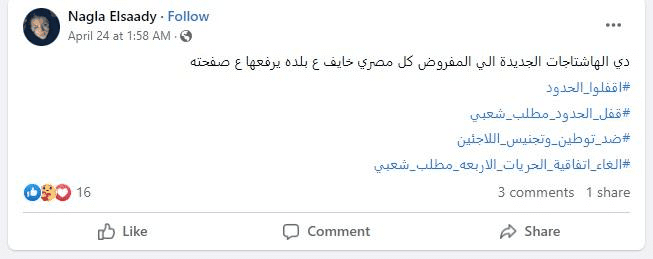
Meanwhile, Facebook has hidden posts published under certain hashtags, and the search results associated with them are entirely obscured. This became apparent when attempting to search for what participants shared in the campaign.
Parallel Hashtag Welcoming Sudanese Individuals
Conversely, the hashtag #Cancel_Entry_Visas_for_Sudanese_to_Egypt has gained traction on Facebook and Twitter, initiated by Egyptians to express their welcome to those coming from Sudan. Within this hashtag, Egyptians emphasized the historical ties between the peoples of both countries and urged Egyptian authorities to facilitate the entry of Sudanese individuals and provide support for them.
Initially, the hashtag sparked discontent among Sudanese individuals, as they believed it called for hindering their entry into Egypt. However, they later expressed gratitude to when it became evident that the opposite was true.
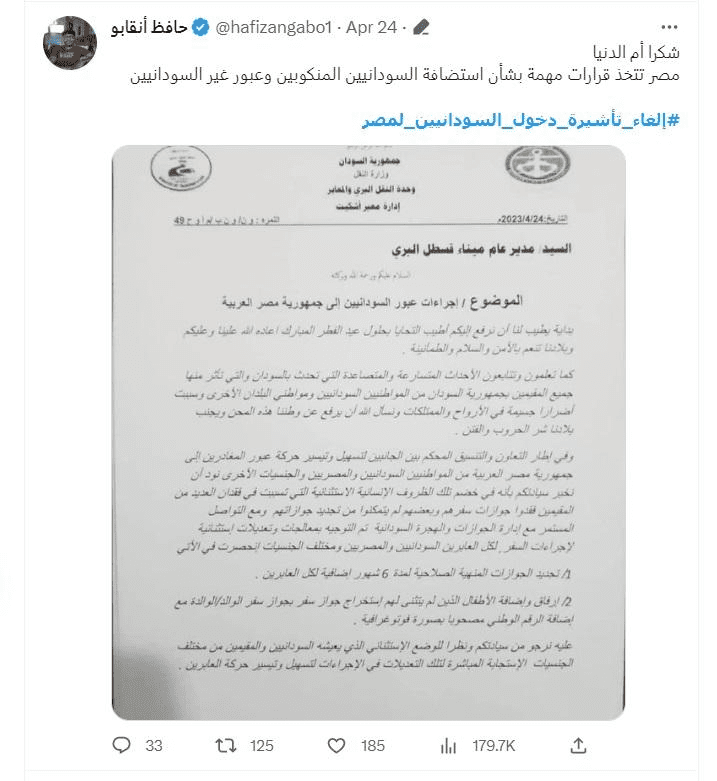
In summary:
- Over 10 active hashtags emerged across various online groups coinciding with the influx of Sudanese citizens fleeing war in their country.
- Both government-supportive and anti-immigrant/foreigner groups engaged in a campaign against refugee arrival in Egypt.
- Some of these groups had their leaders attend official events in the presence of President Abdel Fattah El Sisi, such as the Egyptian Family Iftar and the World Youth Forum.
- Hate speech surfaced during the tweeting wave against refugees and Sudanese individuals arriving in Egypt.
- Official statements, starting with the president and foreign minister, were leveraged to amplify the anti-refugee discourse in Egypt.
Tools Used:
– Twitter Search
– Crowd Tangle
